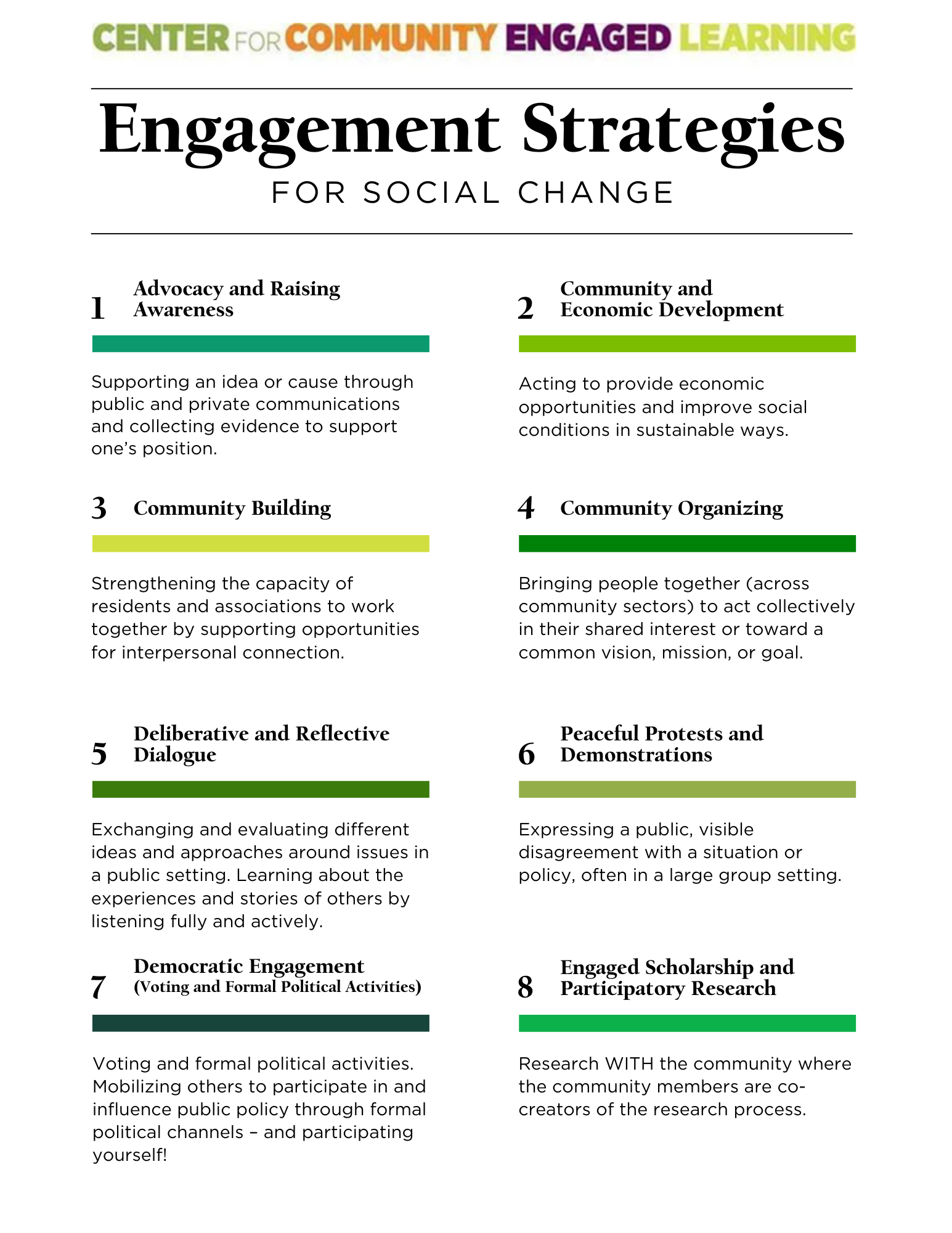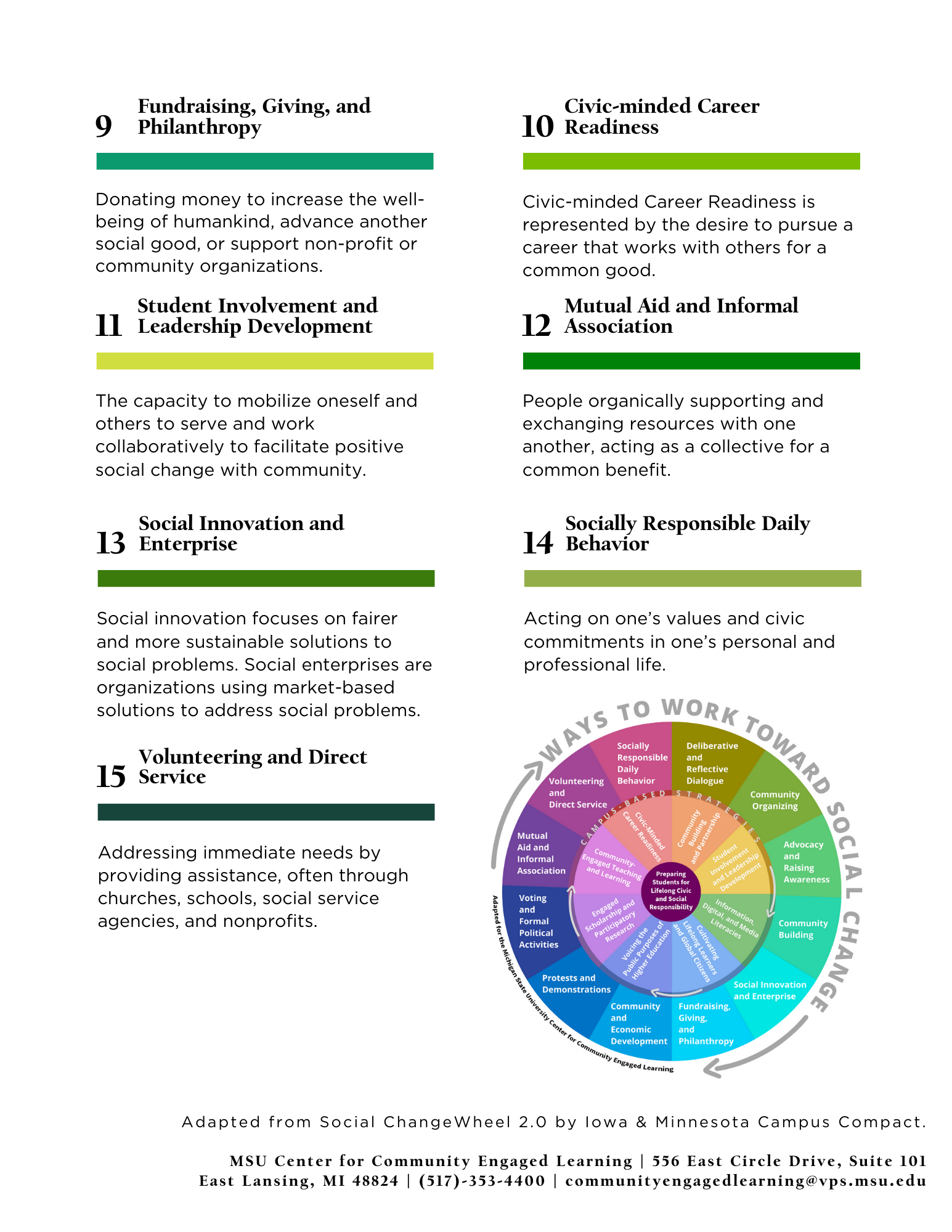What is Community Engaged Learning?
Community Engaged Learning is a teaching and learning strategy that integrates meaningful community partnerships with instruction and critical reflection to enrich the student learning experience, teach civic and social responsibility, and strengthen communities.
Engagement Strategies
Below are 15 Engagement Strategies that can lead toward social change.


Advocacy and Raising Awareness
Supporting an idea or cause through public and private communications and collecting evidence to support one’s position.
- Sharing research or a video that highlights inequities in your community on social media.
- Calling and writing letters to elected officials.
- Telling your peers why an issue matters to you.
Community and Economic Development
Acting to provide economic opportunities and improve social conditions in sustainable ways.
- Developing marketing plans, websites, or other supports to help small businesses grow.
- Offering microloans to aspiring entrepreneurs.
- Supporting community-owned businesses.
- Partnering with community business leaders.
Community Building
Strengthening the capacity of residents and associations to work together by supporting opportunities for interpersonal connection.
- Creating local history projects profiling both long-time and new residents.
- Organizing neighborhood clean-ups or National Night Out activities.
Community Organizing
Bringing people together to act collectively in their shared interest or toward a common goal.
- Mapping the skills, interests, relationships, and other assets of residents to inform work on particular issues.
- Using Gans' public narrative model to surface stories and commitments to a common cause.
Deliberative and Reflective Dialogue
Exchanging and evaluating different ideas and approaches around issues in a public setting. Learning about the experiences and stories of others by listening fully and actively.
- Organizing ongoing dialogues or story circles.
- Creating space for all who wish to speak.
- Facilitating with a National Issue Forums guide.
Peaceful Protests and Demonstrations
Expressing a public, visible disagreement with a situation or policy, often in a large group setting.
- Participating in rallies or marches in support of a cause or to bring awareness to injustice.
- Creating public visual or performance art intended to draw attention to an issue.
- Taking a knee during a national anthem.
Democratic Engagement - Voting and Formal Political Activities
Mobilizing others to participate in and influence public policy through formal political channels – and participating yourself!
- Organizing a voter registration drive.
- Running for public office or working or volunteering on a candidate’s campaign.
- Sharing resources about state voting laws.
Engaged Scholarship and Participatory Research
Research WITH the community where the community members are co-creators of the research process.
- Connecting coursework and academic research to community-identified concerns to enrich knowledge and inform action on social issues.
Fundraising, Giving, and Philanthropy
Donating money to increase the well-being of humankind, advance another social good, or support non-profit or community organizations.
- Holding a fundraiser for a local nonprofit.
- Giving cash or in-kind donations yourself.
- Boosting online days of giving on social media.
- Participating in fundraising phone banking.
Civic-minded Career readiness
Civic-minded Career Readiness is represented by the desire to pursue a career that works with others for a common good.
- Engage in career exploration related to social good
- Interview with non-profit/ social service organizations
- Meeting with a career adviser to explore careers or internships related to social service/ non-profit opportunities
- Research a corporation's social responsibility and philanthropic strategies
Student Involvement and Leadership Development
Student Involvement and Leadership are represented by the capacity to mobilize oneself and others to serve and work collaboratively to facilitate positive social change with community.
- Lead a service project that addresses a community need
- Serve in a leadership position with a service-focused RSO
- Bring others together to address a shared goal of enacting social change
Mutual Aid and Informal Association
Bringing people together to act collectively in their shared interest or toward a common goal.
- Mapping the skills, interests, relationships, and other assets of residents to inform work on particular issues.
- Using Gans' public narrative model to surface stories and commitments to a common cause.
Social Innovation and Enterprise
Social innovation focuses on fairer and more sustainable solutions to social problems. Social enterprises are organizations using market-based solutions to address social problems.
- Creating a business with a "triple bottom line".
- Designing affordable products that purify water.
- Developing an app with a clear social benefit.
Socially Responsible Daily Behavior
Acting on one’s values and civic commitments in one’s personal and professional life.
- Noticing and naming problematic language.
- Understanding the local and broader impacts of your daily routines, habits, and purchases.
- Educating yourself about the people and history of your institution and community.
Volunteering and Direct Service
Addressing immediate needs by providing assistance, often through churches, schools, social service agencies, and nonprofits.
- Helping weekly as a tutor at a local library.
- Distributing donated food at a food bank.
- Cleaning up debris after a disaster or crisis.
- Registering participants at a blood drive


